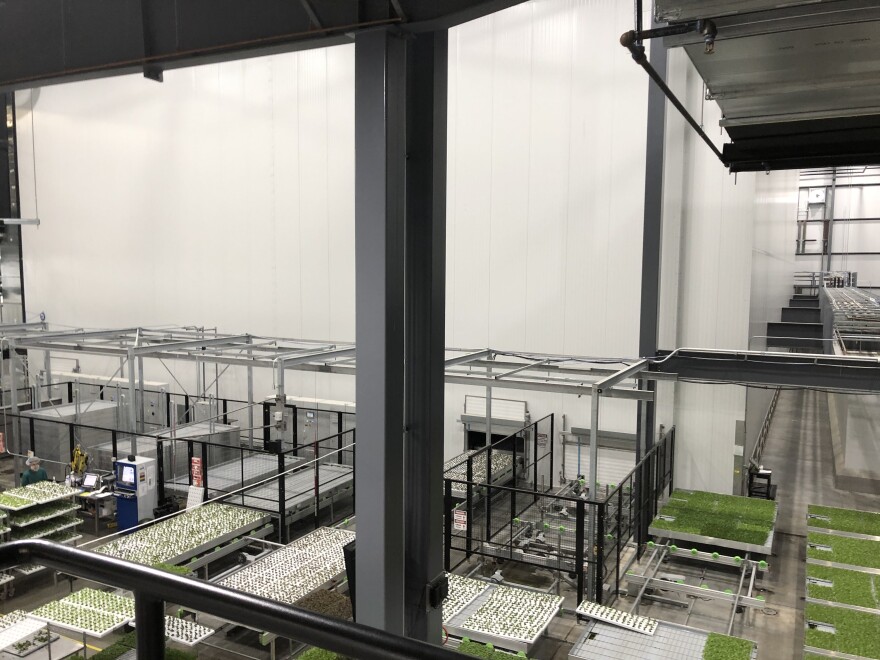Images of the American farm can often be old fashioned — swaying fields of corn, patches of pumpkins or lettuce.
Now, there’s another way to grow produce, and farming may be on the cusp of a major shift thanks to technology.
The evidence for that change can be found on the shelves of a local store — the Dorothy Lane Market in Kettering, where we find produce from 80 Acres Farms.
"We carry the firework cherry tomatoes, which are like — boom! They are delicious," says Michelle Mayhew, produce director for all four Dorothy Lane Market stores. She says they’ve carried the 80 Acres brand since it became available.
"We carry their basils, the little baby cucumbers that the farm grows, and Brooke can probably tell you exactly how they taste because her mom buys them all the time."
Brook Sears is the produce manager.
“We've been carrying it for about four years now and it's really grown over the years," she says. "I would say the last couple of years, especially through COVID, they were able to supply us with salads when nobody else could."
What makes these salad ingredients unusual is that is that they were grown in an indoor vertical growing facility.
"We believe that the vertical growing, indoor growing is definitely a part of the future of growing vegetables," says Mayhew.
The future of growing produce, like those firework cherry tomatoes (which are like, boom, delicious) is taking place some 40 miles south of this store, in Hamilton.
It is an impressive operation.
Noah Zelkind is a manager at 80 Acres Farms, in charge of growing the company. He stands high on a mezzanine overlooking a good portion of the farm, which is inside a building that’s about the size of a football field and a half.
He calls it the “bird's eye view."

It looks a bit like Willy Wonka’s factory, but it’s not chocolate they're making here.
Far below, workers dressed in coveralls, hair nets and gloves are tending to large trays of lettuce, kale, arugula and micro-greens, all in various stages of development.
Car-sized trays are loaded onto conveyor belts that move from station to station, in and out of a giant warehouse-sized cube called "the grow zone."
"So, we seed the product, then we germinate the product, then we transplant the product and then we grow it in the zone, and then we harvest. All the normal farming steps that you'd expect," he says.
Zelkind says because the produce is also packaged here and everything is done under one roof, "We're able to get our product to people in 24 hours, right. 24, maybe 48 hours. Which means that when you see our produce at your grocery store, when you see our food at your restaurant or wherever it may be, you're getting stuff that is a day or two old, not a week or two."
The USDA estimates that on average produce from typical farming loses about 43 percent of its nutritional value as it’s transported from the typical farm to the packager, then to the grocery store.
So, 80 Acres is growing more crops using less land. The “80 Acres” name is inspired by the amount of food they can grow, not the amount of land they use to grow it.

Alexander Greshem-Miller is a grower-operator-supervisor; a self-described "jack-of-all-trades" at the farm. In fact, Zelkind calls him the "voice of the plants."
"The technology is finally advanced enough where we can actually control the entire environment, using 97 percent less water than conventional farming," Greshem-Miller says. "We can pull out 2,500 rounds of crops in a year. [We’re] turning over lettuce in 30 days when conventional farming takes about 180, and with a fraction of the resources."
But, for Noah Zelkind, all this technology comes second to their main mission.
"We’re not doing anything different than people have been doing for thousands of years, which is continuing to try and learn how plants grow, how food grows and how we can continue to grow it better, tastier and faster."
Just how influential vertical farming will be is up for debate, but there’s no denying its potential to solve or alleviate some of the challenges taking place with food production today.
This story has been revised to reflect the following correction: 80 Acres Farms is located in Hamilton in Butler County, not Hamilton County.


